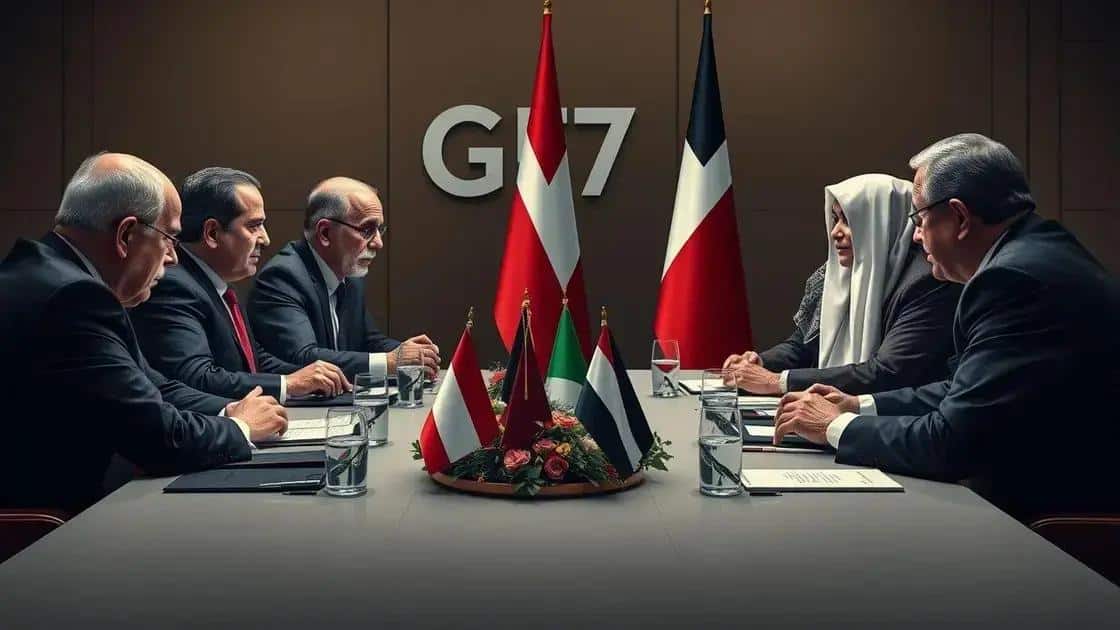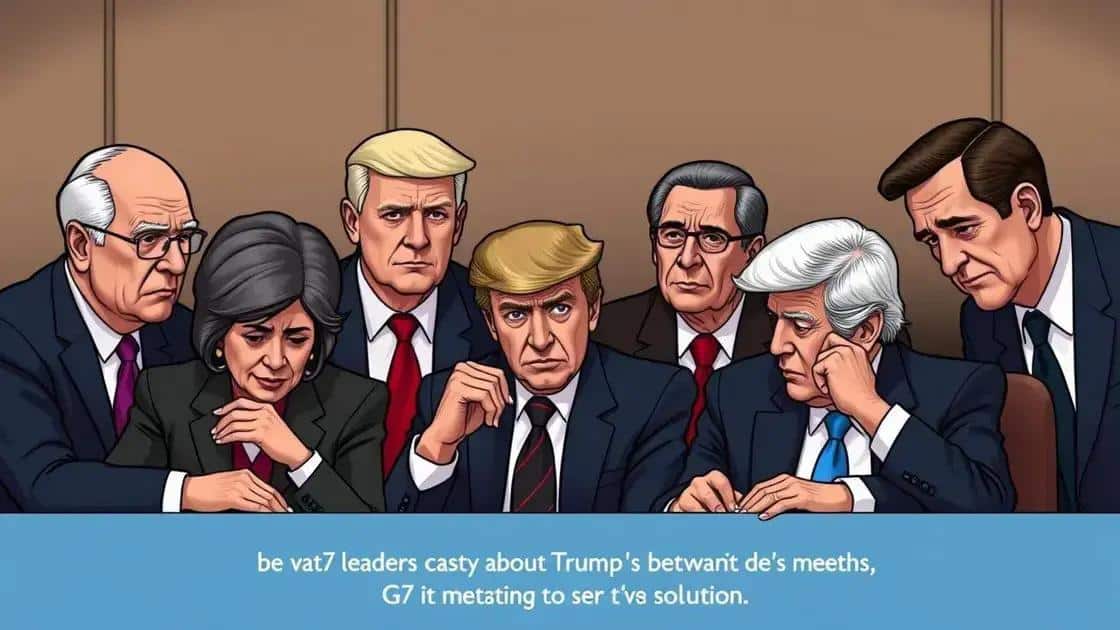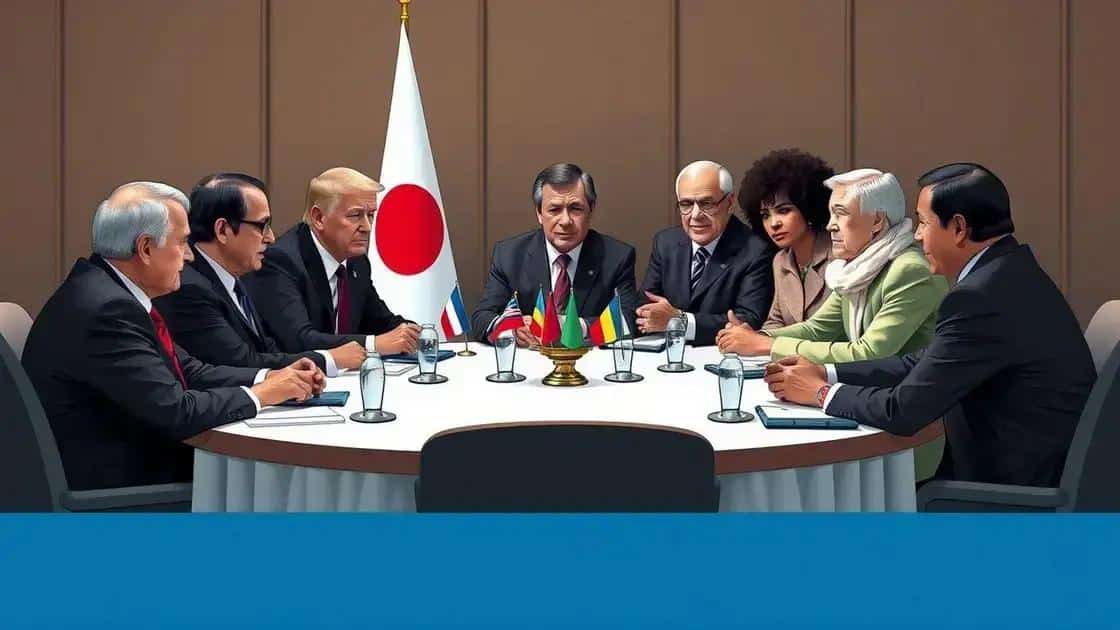Trump leaves G7 over Middle East tensions, what’s next?

Trump leaves the G7 over Middle East tensions, potentially reshaping global politics, influencing future summit agendas, and altering diplomatic relationships among member nations.
Trump leaves G7 over Middle East tensions, marking a significant shift in international relations. This unexpected decision raises many questions about the future of diplomatic efforts and global alliances. What led to this point, and how might it reshape the political landscape?
the impact of Trump’s departure on G7 unity
The recent news of Trump’s departure from the G7 has sent shockwaves through the international community. This unexpected move raises questions about the future of unity among member nations. The G7, a forum for major advanced economies, relies heavily on collaboration and consensus to address global issues.
Potential Fragmentation of Alliances
With Trump stepping back, the G7 unity may face challenges. Other leaders could feel uncertain about their strategies in foreign policy. Without a strong American presence, decisions may take longer, and some countries might pursue their interests independently.
- Increased unilateral actions by member countries.
- Possible shifts in trade agreements.
- Changes in climate policy commitments.
The dynamics within the G7 are essential for addressing critical global challenges. Trump’s departure also highlights differing priorities among the nations. While some leaders may advocate for robust action on climate change, others may focus on economic growth.
Effects on Policy Decisions
As G7 nations navigate the new landscape without Trump’s leadership, they may need to reassess their approaches. The lack of consensus may lead to inconsistent policies on international issues. Countries might need to engage in more negotiations to find common ground.
- Discrepancies in handling global crises.
- Difficulty in reaching a unified stance on trade.
- Challenges in joint ventures and collaborations.
Ultimately, the impact of Trump’s departure on G7 unity reveals the importance of leadership in international relations. This situation could be an opportunity for other nations to step up and redefine their roles within the group.
reactions from other G7 leaders

The reactions from other G7 leaders following Trump’s departure have been mixed, highlighting various perspectives on his influence and the future of the group. Each leader has expressed differing views, reflecting the unique circumstances of their countries and agendas.
Expressions of Concern
Some leaders have voiced concern about the implications of Trump’s exit. For instance, they worry that it could destabilize ongoing partnerships. This sentiment was shared by leaders who have collaborated closely with the U.S. in addressing global challenges.
- Potential disruptions in trade discussions.
- Concerns over climate change initiatives.
- Impact on global security matters.
While these leaders may feel the void left by Trump, they also recognize an opportunity to strengthen their alliances. As they contemplate their next steps, it becomes crucial for the G7 to maintain its focus on collective objectives.
Opportunities for New Leadership
Conversely, some view Trump’s departure as a chance for others to assert more leadership. Countries like Germany and Canada could step up to fill the gap, pushing forward with initiatives that matter to their citizens. This shift might lead to stronger negotiations about environmental policies or economic cooperation.
- Encouraging a more collaborative approach.
- Proposing progressive policies.
- Fostering solidarity among member nations.
These opportunities can help reshape discussions during future summits, promoting a spirit of cooperation that benefits all. The G7’s ability to adapt to these changes will be essential for its relevance.
how Middle East tensions shape global politics
The tensions in the Middle East have a significant impact on global politics, affecting relationships and policy decisions worldwide. These tensions often arise from historical conflicts, resource competition, and varying political agendas, leading to complex interactions among nations.
Influence on International Alliances
As tensions escalate, countries involved in these disputes often re-evaluate their alliances. For instance, nations may choose to support certain factions or governments based on their own interests. This shift can reshape diplomatic relationships significantly.
- Countries align with partners that share common goals.
- New alliances may form based on immediate needs.
- Existing partnerships can weaken due to conflicting interests.
Moreover, the involvement of major powers like the United States and Russia adds another layer to these dynamics. Their positions can sway smaller nations, influencing who gains power in the region.
Impact on Global Economy
The Middle East tensions also have profound economic implications. Disruptions in oil supply from the region can lead to fluctuations in global oil prices, affecting economies far beyond the immediate area. Economic instability can arise, impacting markets and consumers worldwide.
- Rising oil prices can lead to inflation in multiple countries.
- Economic sanctions can change trade patterns significantly.
- Investors may become wary, affecting international investments.
These economic consequences encourage nations to engage in diplomatic solutions to limit disruption. Clearly, the interplay between Middle Eastern conflicts and global politics is crucial for understanding the current world landscape.
potential consequences for future summits

The potential consequences for future summits following Trump’s departure are significant and multifaceted. As the G7 navigates this new terrain, the structure and outcomes of future meetings may be dramatically affected. Each summit has served as a platform for addressing pressing global issues, and changes in leadership dynamics can reshape the agenda.
Revisiting Agenda Priorities
With new leadership from other nations, the focus areas for upcoming summits may shift. Countries that historically aligned with the U.S. on specific topics could prioritize different issues moving forward. This shift may lead to a more diverse range of discussions.
- Climate change may gain greater attention from European nations.
- Global health discussions could become more prominent.
- Economic recovery strategies may be re-evaluated based on regional needs.
The emphasis of future meetings will likely reflect the interests of the leaders present. As such, the G7’s ability to find common ground on these priorities will be essential for productive outcomes.
Changing Diplomatic Relationships
Another consequence is the potential for evolving diplomatic relationships. The absence of a strong American voice might embolden smaller countries to assert their opinions and policies. This democratization of discussions could lead to innovative solutions but may also create tension among nations with diverging interests.
- Smaller nations could push for greater representation of their issues.
- Established powers may need to compromise more often.
- Negotiations could become more complex and time-consuming.
These diplomatic shifts highlight the importance of adaptability and collaboration in international relations. How the G7 adapts to these changes will play a crucial role in maintaining its relevance.
FAQ – Questions about Trump Leaving G7 and Its Impact
What does Trump’s departure from the G7 mean for global politics?
Trump’s departure could shift alliances and alter priorities among member nations, impacting how global issues are addressed.
How might future G7 summits change?
Future summits may see new agenda items and shifting diplomatic relationships, as leaders adapt to the absence of a strong American presence.
What are the economic implications of Middle East tensions?
Tensions in the Middle East can lead to fluctuations in oil prices, affecting global markets and economies outside the region.
Will smaller countries gain more influence in the G7?
Yes, smaller countries may assert their interests more strongly, potentially reshaping discussions and negotiations during G7 meetings.






